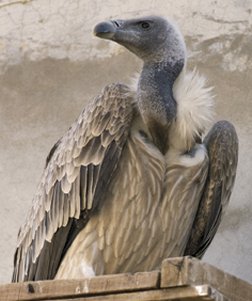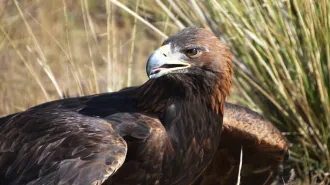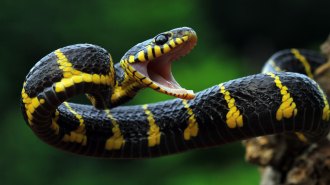An international research team says that it has found a substitute for the livestock drug that has accidentally poisoned most of the vultures of India and neighboring countries.

Last March, India announced that it intended to ban the vulture-killing drug, but no alternative had been identified.
The now-proposed substitute is meloxicam, a nonsteroidal anti-inflammatory drug (NSAID). It didn’t harm several species of Gyps vultures in tests, report Gerry Swan of the University of Pretoria in South Africa and his colleagues. In the March PLoS Biology, they propose that farmers use it, instead of the older NSAID diclofenac, to treat swelling and pain in cattle and water buffalo.
About 2 years ago, a different research team fingered diclofenac as the killer responsible for a population drop in three vulture species. Counts had fallen more than 95 percent since the early 1990s. In the past 2 decades, diclofenac had become popular, and vultures eating carcasses died of kidney failure.
The new study “is likely to prove quite important,” says veterinarian J. Lindsay Oaks of Washington State University in Pullman. Oaks led the effort that identified diclofenac’s role in the vulture disappearances (SN: 1/31/04, p. 69: Vanishing Vultures: Bird deaths linked to vet-drug residues).
The population crash occurred among the oriental white-backed (Gyps bengalensis), long-billed (Gyps indicus), and slender-billed (Gyps tenuirostris) vultures. The vultures had thrived on dead animals left in carcass dumps. The vultures’ decline fueled rising populations of feral dogs, says Rhys Green of the Royal Society for the Protection of Birds in Bedfordshire, England.
In an effort to save the vultures by finding a safer livestock drug, he and other conservationists sent out questionnaires asking zoo veterinarians and animal keepers around the world what NSAIDs they’d used on vultures and what the effects were. In some 30 detailed accounts of vulture medicine, meloxicam stood out as never having been seen to damage the birds’ kidneys. Common NSAIDs typically affect blood flow to animals’ kidneys, and several of the drugs have caused kidney damage in birds.
To test meloxicam, Green and his colleagues started with the African white-backed vulture (Gyps africanus), which is closely related to the declining Indian species but isn’t threatened as a population.
The team administered increasing doses of meloxicam in successive rounds of tests. The birds didn’t show ill effects, and tests of the vultures’ blood failed to show uric acid buildup, which typically precedes kidney problems.
Next, the researchers tested meloxicam on a few vultures of two of the threatened Asian species in a captive-breeding center.
“Meloxicam is already a drug used in cattle, and it appears to be just as effective and safe as diclofenac,” says Oaks. “But currently, it is more expensive, and this is always an issue for farmers, and it remains to be seen if the price can be made comparable.”
Green says that he’s optimistic. Over the past several years, the price of meloxicam has dropped in India to just twice the price of diclofenac or less. The patent on meloxicam is expired, and Green hopes that many companies will jump in to manufacture it.







